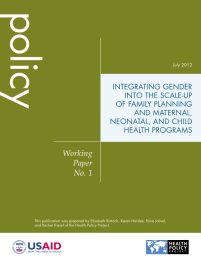The Health Policy Project ended in 2016. Work continued under Health Policy Plus (HP+) until 2022.
PUBLICATION
Author(s): Elisabeth Rottach
Primary Language: English
Date: 2/10/2012
Abstract:
International initiatives, including the Millennium Development Goals, are increasingly recognizing that gender strongly influences the health outcomes of women, men, and children. Relevant literature indicates that the incorporation of strategies to address gender inequality can lead to improved health and program outcomes. Many donors and program implementers have begun to incorporate strategies and approaches that address gender barriers and constraints. However, it is not clear that regular attention is being paid to gender factors during program scale-up.
The Health Policy Project (HPP) conducted a literature review to identify and analyze whether systematic attention to gender factors during the planning and process of scaling up family planning (FP) and maternal, neonatal, and child health (MNCH) programs improves the effectiveness of that process. This working paper focuses on efforts to scale up interventions in FP and MNCH in developing countries. It defines “scale-up” and describes some of the frameworks and approaches to scaling up found in recent health literature and how they address gender. The paper also reviews the experience of selected organizations in scaling up best practices and addressing gender. It identifies a number of lessons learned from scale-up initiatives and lists key recommendations for systematically integrating gender into the scale-up process.
Related resources:
The Policy Dimensions of Scaling Up Health Initiatives
Best Practices Family Planning/Reproductive Health (FP/RH) Gender Maternal Health Report Scale-up Working Papers AME Region Global


